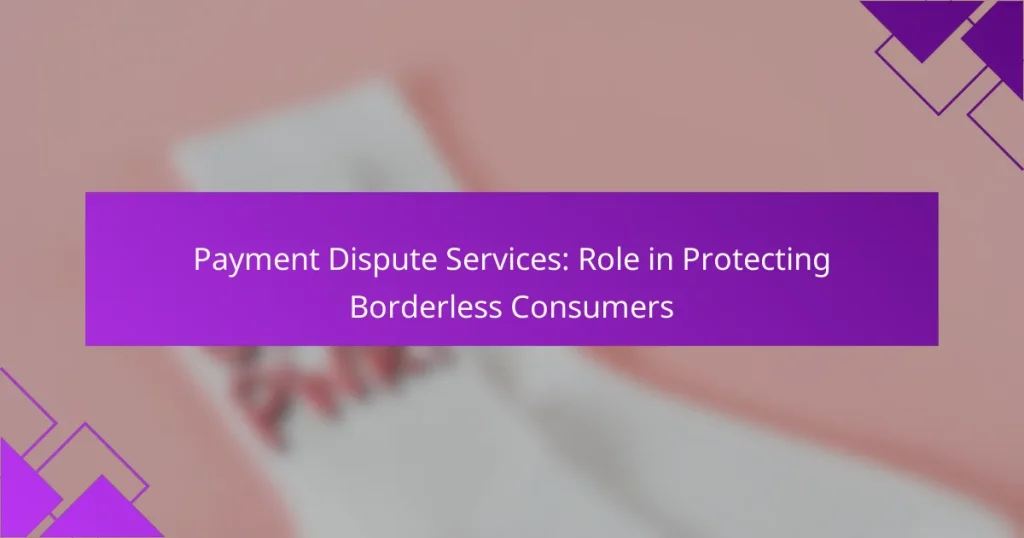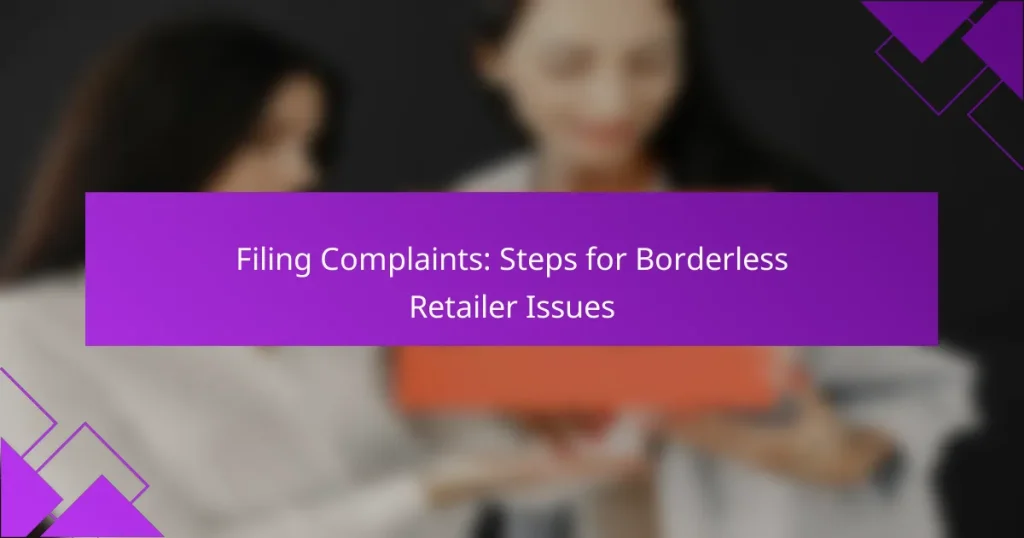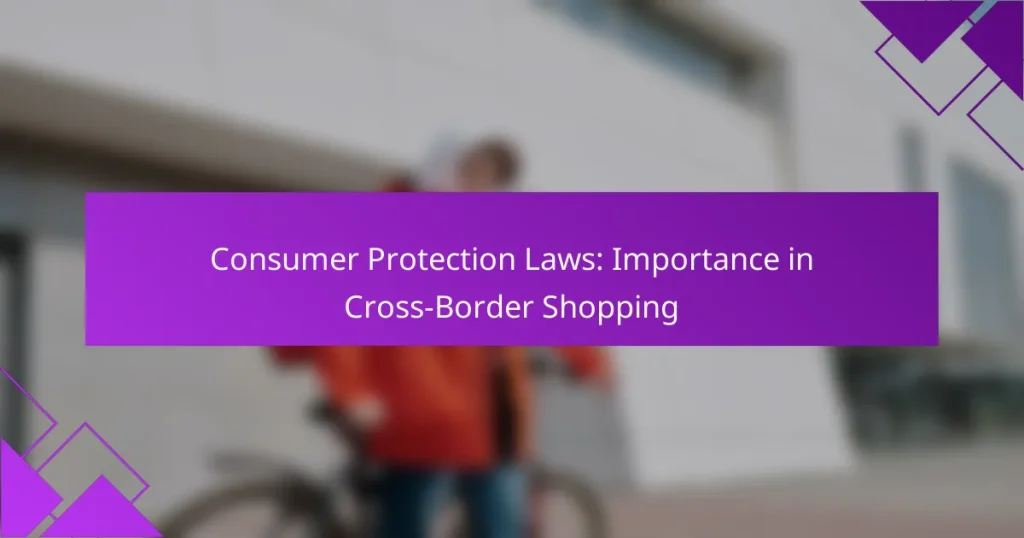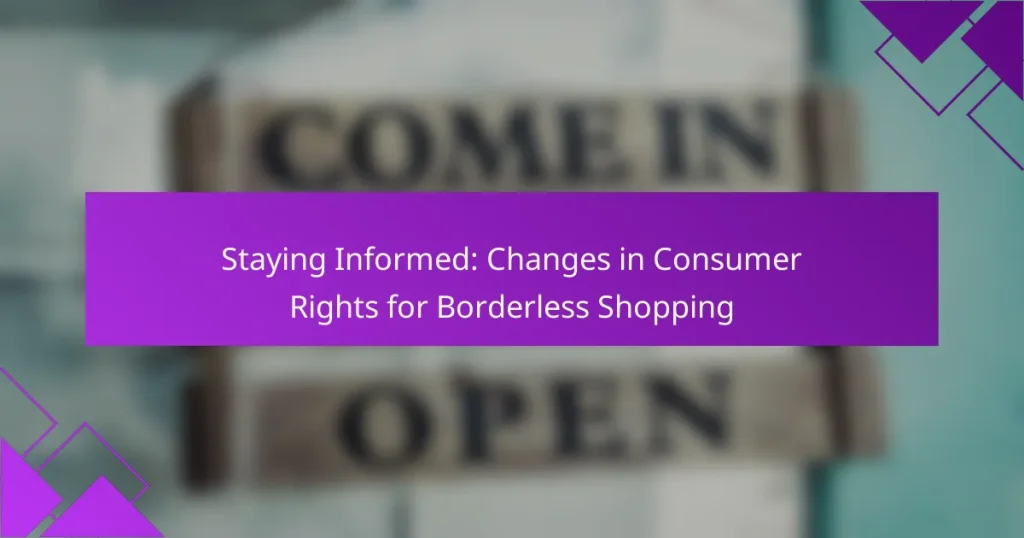Consumer rights in borderless transactions encompass the protections individuals have when buying goods or services internationally. These rights are essential for ensuring fair treatment, quality assurance, and access to remedies in case of disputes. However, they can vary widely depending on local laws and international agreements, making it important for consumers to understand their entitlements when engaging in cross-border purchases.
Warranty Coverage: Key Considerations for International Purchases
Consumer Rights: International Shopping, Complaint Filing, and Protection Laws
Filing Complaints: Steps for Borderless Retailer Issues
Consumer Protection Laws: Importance in Cross-Border Shopping
Safe Transactions: Ensuring Security with Foreign Retailers
Staying Informed: Changes in Consumer Rights for Borderless Shopping
What are consumer rights in borderless transactions?
Consumer rights in borderless transactions refer to the protections and entitlements that individuals have when purchasing goods or services across international borders. These rights ensure that consumers are treated fairly, receive quality products, and have access to remedies in case of issues.
Definition of consumer rights
Consumer rights encompass a range of legal protections that safeguard buyers from unfair practices in the marketplace. These rights typically include the right to information, the right to safety, the right to choose, and the right to be heard. In the context of borderless transactions, these rights may vary based on the laws of the seller’s and buyer’s countries.
For example, a consumer in the European Union has specific rights under the Consumer Rights Directive, which mandates clear information about products and services, as well as the right to a refund within a certain period. Understanding these definitions helps consumers navigate international purchases more effectively.
Importance of consumer rights
Consumer rights are crucial for maintaining trust in cross-border commerce. They empower consumers to make informed decisions and encourage businesses to uphold high standards. When consumers know their rights, they are more likely to engage in international transactions, fostering a competitive marketplace.
Additionally, robust consumer rights can help prevent fraud and exploitation. For instance, if a product is defective or not as described, consumers can seek redress, which may include refunds or replacements. This assurance is vital for encouraging consumers to buy from foreign sellers, knowing they have protections in place.
How do consumer rights vary by country?
Consumer rights differ significantly across countries, influenced by local laws and regulations. Understanding these variations is crucial for consumers engaging in cross-border transactions.
Consumer rights in the European Union
In the European Union (EU), consumer rights are robust and standardized across member states. The Consumer Rights Directive ensures that consumers have the right to clear information, a 14-day cooling-off period for online purchases, and protection against unfair contract terms.
Consumers can expect refunds or exchanges for faulty goods, and businesses must provide clear terms and conditions. Additionally, the EU has established regulations on data protection, ensuring that consumer information is handled securely.
Consumer rights in the United States
In the United States, consumer rights are more fragmented, with protections varying by state. Federal laws, such as the Fair Credit Reporting Act and the Consumer Product Safety Act, provide some level of protection, but states often have their own specific regulations.
Consumers should be aware of their rights regarding refunds, returns, and warranties, which can differ widely. For example, some states mandate a minimum return period, while others do not. It is advisable for consumers to familiarize themselves with local laws to ensure they understand their rights in any transaction.
What protections exist for online purchases across borders?
Consumers engaging in online purchases across borders are generally protected by a combination of international agreements and local laws. These protections can vary significantly by country, but they often include rights related to refunds, product quality, and dispute resolution mechanisms.
International Consumer Protection and Enforcement Network
The International Consumer Protection and Enforcement Network (ICPEN) is a collaborative effort among countries to enhance consumer protection in cross-border transactions. It focuses on sharing information about consumer fraud and enforcing laws against deceptive practices.
Consumers can benefit from ICPEN’s resources, which include guidance on how to report issues and seek redress. For instance, if a product purchased from another country is defective, ICPEN can help connect consumers with the appropriate enforcement agencies in their home country.
Consumer Online Privacy Rights
Consumer online privacy rights are crucial in cross-border transactions, as they govern how personal data is collected, used, and shared by businesses. Many regions, such as the European Union with its General Data Protection Regulation (GDPR), have strict rules that protect consumer data from misuse.
When shopping online internationally, consumers should be aware of the privacy policies of the websites they use. It’s advisable to look for clear information on data handling practices and to ensure that the site complies with relevant privacy laws. Consumers should also consider using secure payment methods that offer additional layers of protection for their personal information.
How can consumers resolve disputes in cross-border transactions?
Consumers can resolve disputes in cross-border transactions through various methods, including negotiation, mediation, and arbitration. Understanding these options is essential for effectively addressing issues that arise when purchasing goods or services from foreign sellers.
Dispute resolution mechanisms
Dispute resolution mechanisms are structured processes that help consumers and businesses settle conflicts without resorting to litigation. Common methods include negotiation, where parties communicate directly to reach an agreement, and mediation, which involves a neutral third party facilitating the discussion.
Arbitration is another option, where an arbitrator makes a binding decision after hearing both sides. Consumers should consider the costs, timeframes, and enforceability of each method, as these can vary significantly depending on the jurisdiction and the specific terms agreed upon.
Role of consumer protection agencies
Consumer protection agencies play a crucial role in assisting individuals with disputes in cross-border transactions. These agencies often provide resources, guidance, and sometimes mediation services to help consumers navigate their rights and options.
In many countries, such as those within the European Union, agencies collaborate to ensure that consumers can access support regardless of where the transaction occurred. Consumers should familiarize themselves with the relevant agency in their country and understand how to file complaints or seek assistance effectively.
What are the challenges in enforcing consumer rights internationally?
Enforcing consumer rights internationally presents several challenges, primarily due to varying laws and jurisdictions. These differences can complicate dispute resolution and hinder effective protection for consumers engaging in cross-border transactions.
Jurisdiction issues
Jurisdiction issues arise when determining which country’s laws apply to a transaction. Consumers may find it difficult to know where to file complaints or seek redress, especially if the seller operates in a different country. This uncertainty can lead to delays and increased costs in resolving disputes.
For example, if a consumer in Germany purchases a product from a seller in the United States, they may be unsure whether to pursue the case under German or U.S. law. This complexity can discourage consumers from taking action, knowing that legal proceedings may be lengthy and expensive.
Differences in legal frameworks
Differences in legal frameworks can significantly impact consumer rights. Each country has its own set of laws governing consumer protection, which can lead to inconsistencies in how rights are defined and enforced. For instance, some countries may have strict return policies, while others may not offer any protections for online purchases.
Additionally, regulations regarding data protection, warranty terms, and product liability can vary widely. Consumers should familiarize themselves with the legal standards in both their own country and the seller’s country to understand their rights fully. This knowledge can help them make informed decisions and avoid potential pitfalls in cross-border transactions.
How to choose a reliable online retailer for borderless transactions?
To choose a reliable online retailer for borderless transactions, prioritize retailers with established reputations, clear return policies, and secure payment options. Look for platforms that offer customer support and transparent shipping information to ensure a smooth purchasing experience.
Key factors to consider
When selecting an online retailer, consider payment security, shipping options, and customer service. Ensure the retailer uses secure payment gateways like PayPal or Stripe, which provide buyer protection. Evaluate shipping times and costs, as international deliveries can vary significantly.
Additionally, check if the retailer provides clear information about customs duties and taxes, which can affect the total cost of your purchase. A reliable retailer should also have a straightforward return policy that accommodates international transactions.
Reputation and reviews
Researching a retailer’s reputation is crucial for borderless transactions. Look for customer reviews on independent sites and forums to gauge the experiences of other buyers. Positive feedback can indicate reliability, while consistent complaints may signal potential issues.
Utilize platforms like Trustpilot or Google Reviews to find comprehensive ratings. Pay attention to how the retailer responds to negative feedback, as this can reveal their commitment to customer satisfaction and problem resolution.
What are the emerging trends in consumer rights for global transactions?
Emerging trends in consumer rights for global transactions focus on enhancing transparency, security, and accessibility. As online shopping and cross-border trade grow, consumers are increasingly demanding protections that adapt to digital environments and diverse jurisdictions.
Impact of digital currencies
Digital currencies are reshaping consumer rights by introducing new payment methods that can bypass traditional banking systems. This shift can enhance transaction speed and reduce fees, but it also raises concerns about security and regulatory oversight.
Consumers using digital currencies should be aware of the volatility associated with these assets. Prices can fluctuate significantly, impacting the value of transactions. It is advisable to use stablecoins or other less volatile options for everyday purchases to minimize risk.
Future of international consumer protection laws
The future of international consumer protection laws is likely to evolve in response to the complexities of global commerce. Countries are beginning to collaborate on frameworks that address issues like data privacy, product safety, and dispute resolution across borders.
Consumers should stay informed about their rights in different jurisdictions, as protections can vary widely. Engaging with consumer advocacy groups can provide valuable insights into local regulations and help navigate cross-border transactions effectively.






